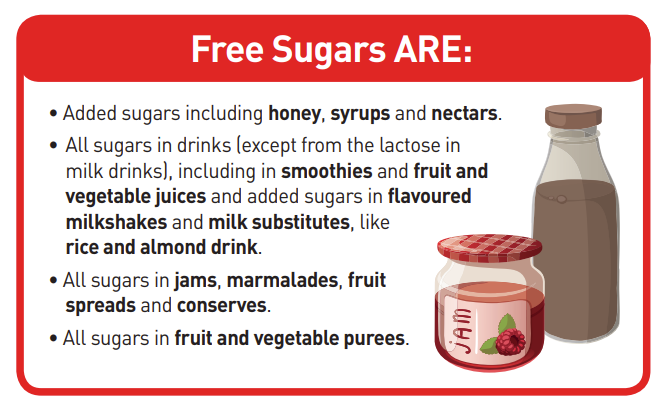12th August 2022
We are delighted to share this Voices blog by Rachel Childs, Nutritionist at First Steps Nutrition Trust, on the recent British Dental Association (BDA) research on baby food pouches.

Rachel Childs, Nutritionist, First Steps Nutrition Trust
The British Dental Association (BDA) recently researched the sugar content of baby food pouches marketed to infants and young children (‘Boutique’ baby food more sugary than Coca-Cola ‘rotting children’s teeth’ (telegraph.co.uk)). Results were alarming, with pouches containing up to 5 times as much sugar per 100g as Coca Cola. The full results of the research, including details on specific items, can be found here. They reveal that the highest levels of sugar are found in the ‘boutique’ brands such as Ella’s Kitchen and Annabel Karmel.

Although parents are led to believe that commercially-produced fruit and vegetable-based purées are appropriate ‘first foods’ for infants, they are often high in the free sugars associated with dental decay; the primary reason for hospital admissions in young children in the UK. In addition, the foods that infants are exposed to at an early age have long-lasting effects on their liking of specific tastes as infants learn to recognise the flavours, texture and appearance of individual fruits and vegetables. Evidence suggests that feeding infants bland, sweet, highly processed purées may lead children to develop fussy eating patterns, rejecting healthy family foods in favour of highly processed foods – one of the causes of overweight, obesity and other chronic diseases later in life.
As we reported in our 2017 review of UK baby foods, processing fruits and vegetables into a puréed form may also promote over-consumption, as the energy density and physical structure of foods is altered, impacting on satiety and energy intake. Additionally, puréed foods are smoother than their unprocessed or minimally processed counterparts and so can be rapidly swallowed, making it more difficult for care-givers to know when their infant has had enough to eat.
Unfortunately, the clever but inappropriate marketing on baby food pouches that we highlighted in 2018 still persists, and the numerous misleading health and nutrition claims make it hard for parents and carers to make informed choices on what to feed their children. Here are some of the misleading claims documented by the BDA survey, and the evidence or public health guidance refuting these claims:
- Suitable for children 4m+ – The NHS recommends introducing solid foods from around 6 months of age when the baby is showing signs of developmental readiness.
- Only contains naturally occurring sugars / no added sugar – All free sugars, regardless of source, are associated with dental caries and weight gain. This includes sugars “naturally present in fruit and vegetable juices, purées and pastes and similar products in which the structure has been broken down”. Action on Sugar has produced a helpful guide on how to identify the free sugar content of foods which can be accessed here.
- Nutritionally approved / in line with infants nutritional and developmental needs – the UK Government’s Scientific Advisory Committee on Nutrition recommends that the average intake of free sugars should not exceed 5% total dietary energy intake for young children over 2 years of age. This equates to a maximum of 13g per day for girls aged 2-3 years and 15g per day for boys of the same age. Roughly 60% of the pouches surveyed by the BDA contain enough free sugar to exceed the maximum daily intake for girls aged 2-3 years if two pouches were consumed in a day, and a further 10% exceeded the maximum intake among this age group in a single pouch.
- High in fibre/contains one of your five a day – although intact fruits and vegetables are a good source of fibre and vitamins, processing may result in changes in the quantity and bioavailability of nutrients and phytonutrients in foods. The evidence we reviewed for our 2018 report on baby food purées suggests that the processing techniques required to produce baby foods are linked with losses of total fibre, glucosinolates and heat-sensitive nutrients such as vitamin C.
It is also important to note that on-pack instructions to “eat straight from the pouch” are against NHS guidance. Sucking from the pouch increases the risk of dental decay, does not allow children to see the food they are eating, does not allow infants or care-givers to know how much they are eating, and changes eating from a chewing to a sucking experience.
We support the BDA’s call for action to tackle the inappropriate marketing of baby food pouches, which needs to be a part of efforts to prevent the inappropriate marketing of all formula, foods and drinks aimed at infants and young children, in order to protect the short and long-term health of this vulnerable group. We await the promised Government consultation on the marketing and labelling of baby foods.
See our Eating Well: the First Year guide on introducing solids and eating well up to baby’s first birthday for evidence-based and conflict-free information and practical advice on feeding babies.







